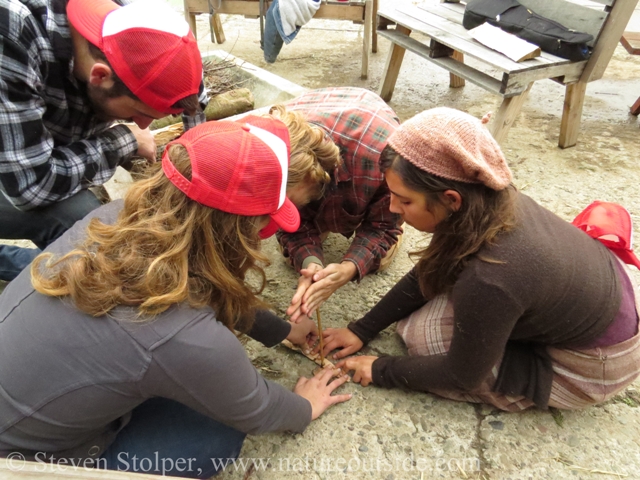
Just before the holidays I attended a bird sit at a community supported farm. Afterwards was a pot-luck dinner and lecture by author Jon Young. Jon’s book, What the Robin Knows, teaches readers bird language so they can be more aware of wildlife around them.
The event took place in a barn, and attendees milled about outside as the staff made final preparations. The interns and volunteers darted about in red and white baseball caps setting up tables, chairs, and bales of hay for seating.
The day was moody and overcast with light drizzle throughout. Despite our heavy jackets, several of the guests shifted their weight from foot to foot in an effort to forestall the damp chill. Noticing this, the staff decided to kindle a fire in an outdoor fire pan.
My back was to the three staff members, but I overheard their conversation about the fire. I turned fully expecting to see one of them holding a cigarette lighter and newspaper. Instead, I saw them settle to the ground with a Creek Willow spindle and a cedar hearth board.
Carry Your Fire Within
It’s not often that I’m surprised. But this was an unexpected treat! I wandered over to see what they were doing.
Hand drill is a friction fire lighting method where you spin a wood dowel between your hands very quickly. You place the end of the dowel against an indentation in a “hearth board.” Friction between the two pieces of wood creates very hot sawdust that gathers in a notch cut into the board. The dust coalesces into an ember that you transfer to a tinder bundle made from plant material that ignites very easily. You then blow this nest, with the ember at its center, into flame.
This techniques has been used by indigenous peoples for thousands of years. What makes the technique challenging is that our tender office-conditioned hands are better suited to typing than spinning a coal.
Fire by Friction
The interns had a false start. They attempted to use an indentation that they had used before. But it had been polished smooth by previous attempts and could not generate enough friction to heat the sawdust. After using a (rather dull) knife to carve a new indentation and notch, they were ready to try again.
They took turns on the spindle so no one person became too tired.
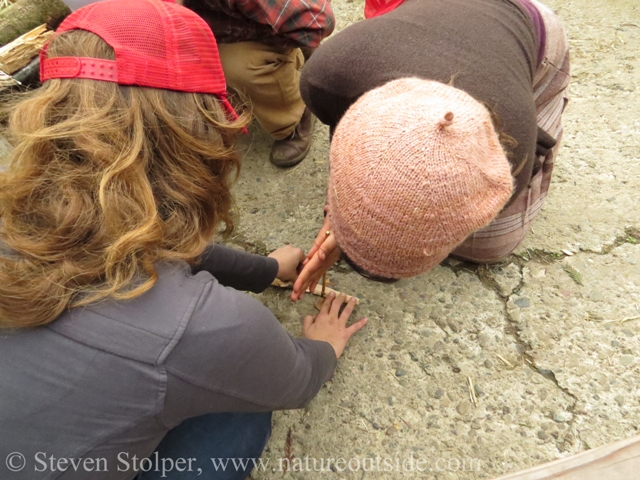
You spin the spindle rapidly between your palms. There is also a technique that uses the bottom edge of your little fingers.
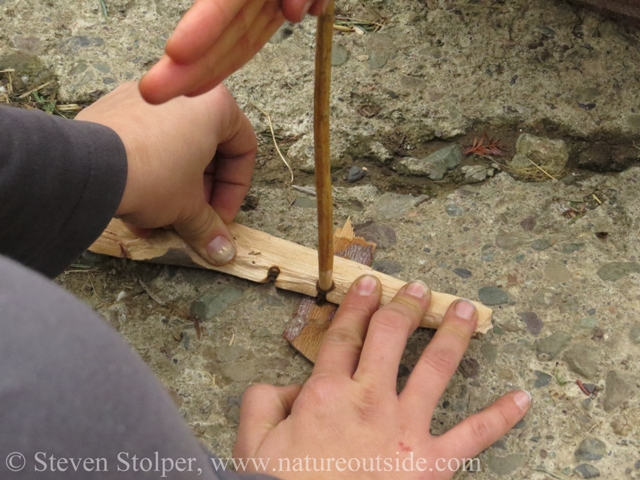
The spindle seats in a circular indentation with a pie-shaped notch, where the ember forms.
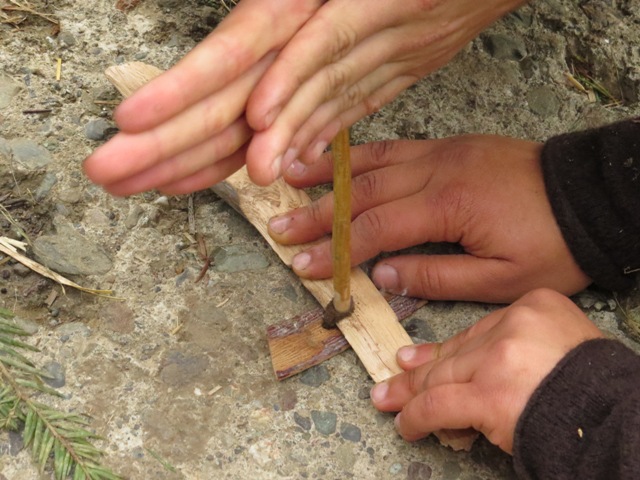
A close up of the ember. The black dust is generated and heated by the friction of the spindle. You can see white smoke beginning to rise in front of the holder’s thumb.
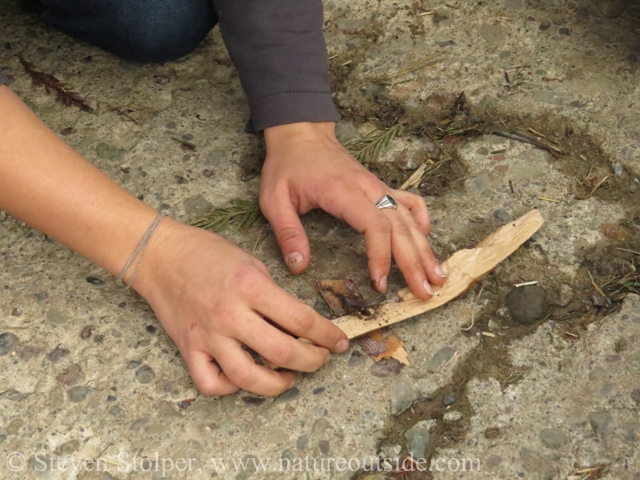
Once you have a coal, you carefully transfer it to a piece of bark.
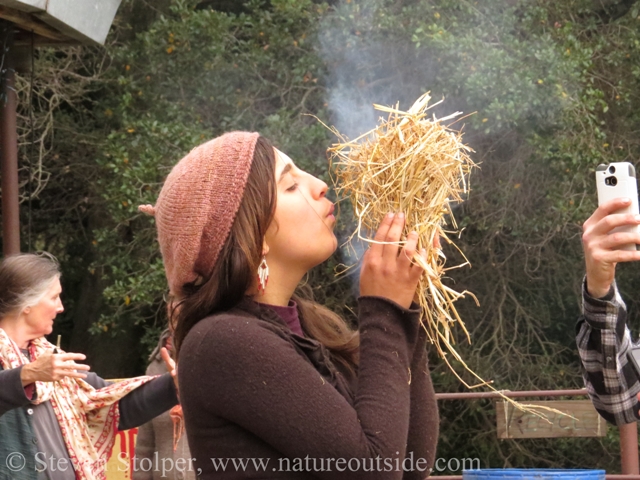
The bark is used to place the ember into your tinder bundle. Then, blow the bundle into flame.
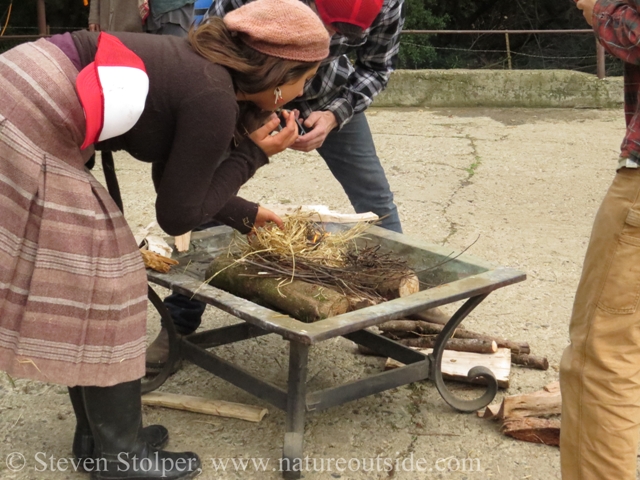
Lay the flaming bundle where you want the fire. Feed it kindling until you have a steady blaze. Notice that they had already prepared their kindling, which is sitting on the larger logs ready to be used.
Keep Your Flame Alive
It was both unexpected and enjoyable to see the interns use this ancient technique to kindle their fire. I hope it is a harbinger for the new year.
I wish you the best for a happy and healthy year to come. Hopefully it will be filled with unexpected and pleasant experiences like this one. Try to master a technique like this yourself. It will help you to keep your flame alive in the coming year.
For fun facts and useful tips, join the free Bushcraft Newsletter.



Nice description of their fire. How was the program? I really enjoyed his coyote mentoring book.
Jon’s lecture was very good! He discussed the need to reconnect with nature both for individual and societal health. He then described his efforts to develop programs for children to connect with nature by learning bird language. His current initiative with the Audubon Society will bring bird language classes to Audubon centers throughout the US and Canada. It sounds very exciting.
The bird sit portion of the day was run by a local nature education charity. I had prior experience with bird language and was a little disappointed with the quality of the mentoring. However, I tend to be very regimented in my approach to education and may not have connected with the way the instructors seemed to be “winging it.” (sorry about the pun)
On a personal note, I had a wonderful discussion with Jon and he wrote a nice inscription in my copy of “What the Robin Knows.”
Hi Steve!
Two movies that address the importance of primative fire making skills are “Quest For Fire” and “Castaway “. I learned a lot from these movies!
We keep our charcloth, matches, cotton balls/Vaseline, pine knot tinder, and birthday candles in the $.99 Coleman orange match cases.
Tommy Lofton
Tommy, I like the wide variety of tinder you have available. It sounds like you’re prepared to make fire whenever you need.